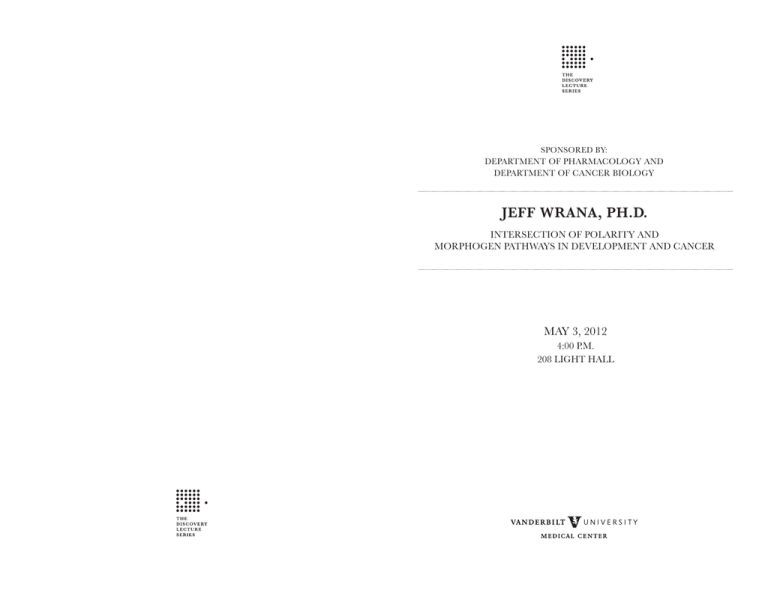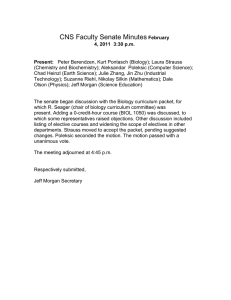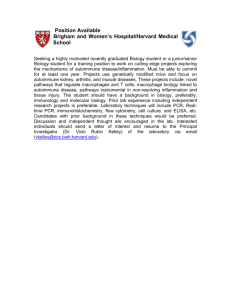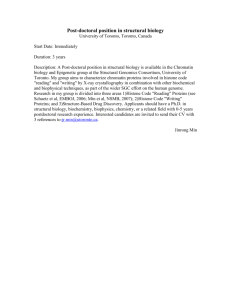Jeff wrana, Ph.D. may 3, 2012 interSection of polarity and
advertisement

Sponsored by: Department of Pharmacology and Department of Cancer Biology Jeff wrana, Ph.D. Intersection of Polarity and Morphogen Pathways in Development and Cancer May 3, 2012 4:00 p.m. 208 Light hall Intersection of Polarity and Morphogen Pathways in Development and Cancer Dr. Wrana’s research program involves the application of high-throughput, robotics-based technologies that perform thousands of tests at a time and enable studies of gene function on a genome-wide scale. With his special expertise and phenomenal success securing support from granting agencies, he has established a Robotics Facility at the Lunenfeld Institute. The expertise and advanced technology available in the facility extends the research capacity of scientists throughout the Lunenfeld and beyond. Jeff wrana, Ph.D. In February 2009, Dr. Wrana unveiled a new technology tool that analyzes breast cancer tumours to determine a patient’s best treatment options. The technology, called ‘DyNeMo’ analyzes networks of proteins in cancer cells, and can predict with more than 80 per cent accuracy a patient’s chance of recovering from breast cancer. Wrana and his team hope that the technology will eventually provide individualized analysis to breast cancer patients and their oncologists so that they are better informed and empowered to select a treatment best suited to them. Howard Hughes Medical Institute International Research Scholar Dr. Wrana has also made significant discoveries related to colorectal and other cancers. In particular, he is interested in metastasis – the spread of cancer from its initial site to other places throughout the body – which is responsible for 90 percent of cancer deaths. Insights into this little-understood process have the potential to make a significant impact on survival rates for breast and other cancers. Investigator, Department of Molecular Biology and Cancer Samuel Luenfeld Research Institute, Mount Sinai Hospital Professor, Medical Genetics and Microbiology, University of Toronto Dr. Jeff Wrana is internationally recognized for his cancer research. While most current cancer investigations focus on specific disease pathways, Dr. Wrana believes cancer involves a complex network of pathways that work together to misregulate cells and cause disease. His research aims to expose the mechanisms involved in the development of these networks and to reveal new targets for treatments that would attack the entire disease network, not just individual hubs. Dr. Wrana’s numerous awards and honours are a testament to his research success. In 2010, Dr. Wrana was awarded the Premier’s Summit Award. He has been a Howard Hughes Medical Institute International Research Scholar since 2002 and in 2005 he was awarded a prestigious Tier I Canada Research Chair. He has received a number of prizes for his research excellence including the William E. Rawls Prize from the National Cancer Institute of Canada (1998), the Merck Frosst Prize from the Canadian Society of Biochemistry Molecular and Cell Biology (2002), and the Paul Marks Prize for Cancer Research from the Memorial Sloan Kettering Institute (2005). In 2006 he was inducted into the Royal Society of Canada. Dr. Wrana is a Senior Investigator in the Centre for Systems Biology at the Samuel Lunenfeld Research Institute and a Professor in the Department of Molecular Genetics at the University of Toronto. He received his Ph.D. in biochemistry in 1991 from the University of Toronto, and completed postdoctoral training at the Memorial Sloan-Kettering Cancer Center in New York.





